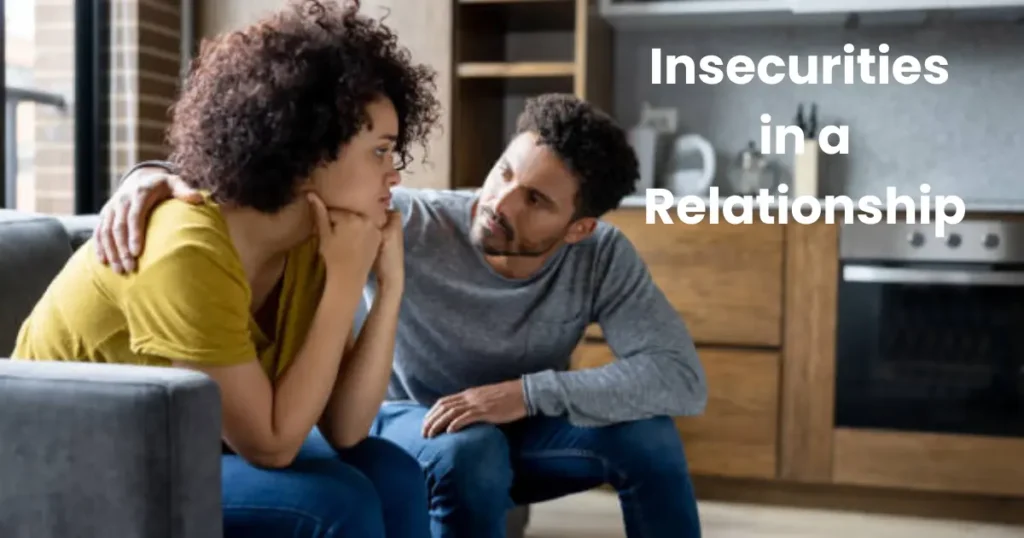Last updated on February 6th, 2026 at 12:51 pm
“Insecurity is a relationship killer. If you don’t deal with it, it will deal with you.” — Unknown
Insecurities in a relationship can quietly damage even the strongest bonds. Whether it’s feeling not good enough, fearing abandonment, or constantly seeking reassurance, these doubts can shake your emotional foundation.
This guide combines the latest insights, expert quotes, and real-life advice to help you understand what it means to be insecure in a relationship, the causes of insecurity in relationships, and how to address insecurity in a relationship in a healthy and lasting way.
Key Takeaways
- Insecurity in relationships is common but manageable.
- Root causes include past trauma, low self-esteem, and attachment styles.
- Signs of insecurity in relationships range from jealousy to emotional withdrawal.
- Healing comes from communication, self-awareness, and emotional growth.

What Does Insecure in a Relationship Mean?
Being insecure in a relationship means feeling uncertain, anxious, or unworthy in your romantic bond. The meaning of insecure in a relationship often involves fears of abandonment, low self-esteem, or doubts about your partner’s love. People experiencing relationship insecurity may worry constantly about being replaced, not being enough, or being unloved.
“Insecurity in relationships is not a flaw, it’s a signal that something inside needs healing.” — Dr. Sue Johnson
Causes of Insecurity in Relationships
1. Past Trauma or Betrayal
Previous hurtful experiences can cause deep emotional wounds, leading to insecurity in a relationship.
According to Dr. Sabrina Romanoff, PsyD, a clinical psychologist and professor at Yeshiva University, such unresolved emotional injuries are a major source of relationship insecurity.
Source: Dr. Sabrina Romanoff
2. Anxious or Avoidant Attachment Styles
Attachment insecurity often develops in childhood and affects how secure you feel in adult relationships.
3. Low Self-Esteem
Feeling unworthy or doubting your value can fuel relationship insecurities.
Related read: How to Build Self-Esteem: A Guide to Confidence
4. Social Comparison
Comparing your relationship to others on social media can make you feel insecure about your relationship.
Read More: Top Impacts of Social Media on Communication
5. Fear of Rejection
Worrying about being abandoned or rejected is a common cause of insecurity in relationships.
“People who are insecure in relationships often seek external validation to fill an internal void.” — Lisa Firestone, Ph.D.
Signs of Insecurity in Relationships
- Constant need for reassurance
- Jealousy and possessiveness
- Overanalyzing texts or gestures
- Controlling behaviors
- Avoiding vulnerability
- Low self-worth
- Fear of being replaced
- Excessive seeking of compliments
- Emotional withdrawal
Impact of Insecurity on Relationships
Emotional Distance: Insecurity can cause emotional withdrawal or conflict, creating distance.
Trust Issues: Lack of trust is a major impact of insecurity in relationships.
Communication Problems: Fear and doubt lead to misunderstandings and poor communication.
Breakdowns and Burnout: Constant insecurity drains emotional energy from both partners.
“The quality of your relationships determines the quality of your life.” — Esther Perel
- Over 52% of breakups are influenced by unresolved insecurities or lack of trust (2024 Journal of Relationship Studies).
1. Open Communication
How to Deal with Insecurity in a Relationship
Learn how to communicate insecurities in a relationship by using “I feel” statements instead of blame.
Example: “I feel anxious when you don’t respond quickly.”
2. Self-Reflection
Ask yourself if your fears are based on past pain or current reality.
3. Build Self-Worth
Engage in hobbies, set goals, and surround yourself with positivity.
related read: How to Become Emotionally Strong? With Additional Tips
4. Understand Attachment Styles
Knowing your and your partner’s attachment style helps reduce insecurity.
5. Seek Therapy
Professional help like CBT or couples counseling can address deep-rooted issues.
6. Set Boundaries
Clear emotional and personal boundaries foster respect and security.
7. Practice Empathy
Try to understand your partner’s perspective to reduce misunderstandings.
8. Avoid Overthinking
Challenge negative thoughts with evidence-based thinking.

How to Communicate Insecurities in a Relationship
- Choose the right time and setting
- Be honest but gentle
- Use non-defensive language
- Encourage two-way sharing
- Focus on problem-solving together
Example:
Instead of: “You never make me feel loved!”
Try: “Sometimes I feel distant, and I’d love to feel more connected.”
Insecurities in a Relationship Examples
- Feeling unworthy due to body image issues
- Anxiety from past cheating
- Fear that ambition will cause emotional distance
- Mental health concerns causing fear of being a burden
“You are not too sensitive or too emotional. Your feelings are valid.”
Conclusion
Insecurities in a relationship don’t have to lead to emotional chaos or separation. With honest reflection, open communication, and consistent self-growth, you can build a relationship grounded in security and love.
“Emotional security isn’t about never feeling afraid. It’s about knowing you can face fear together.”
Take the first step. Heal your inner world, and watch your relationship transform.
FAQs
What are the most common insecurities in a relationship?
The most common insecurities include fear of abandonment, feeling “not good enough,” trust issues from past experiences, and comparing your relationship to others. These can cause jealousy, need for constant reassurance, or emotional withdrawal.
How can I stop being insecure in a relationship?
Work on your self-esteem, communicate openly with your partner, trust your instincts, and seek professional help if needed. Building self-awareness and understanding your triggers are key steps.
Is it normal to feel insecure in a relationship?
Yes, occasional insecurity is normal because relationships involve vulnerability. But if insecurity becomes overwhelming or affects your daily life, it’s important to address it.
What are the causes of insecurities in relationships?
Common causes include past trauma, low self-esteem, anxious attachment styles, poor communication, and lack of trust.
How to stop being insecure after being cheated on?
Healing involves grieving the betrayal, processing emotions (often with therapy), and deciding whether to rebuild trust or move on. Focusing on your self-worth is essential.
How do you fix insecurity in a relationship?
Acknowledge the insecurity, identify its roots, improve self-esteem, communicate assertively, set boundaries, and seek professional guidance if needed.

